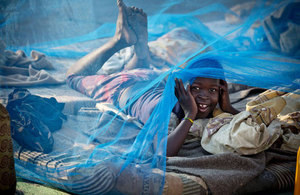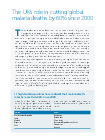Malaria death rates drop by 60%
The Millennium Development Goals target on malaria has been achieved with a sharp drop in cases and mortality.

British support for bednets has helped the sharp fall in malaria cases. Picture: Kate Holt/UNICEF
Malaria death rates have plunged by 60% since 2000, translating into 6.2 million lives saved, the vast majority of them children, according to a joint World Health Organisation (WHO) - UNICEF report released today.
The report shows that the malaria MDG target to “have halted and begun to reverse the incidence” of malaria by 2015, has been met convincingly, with new malaria cases dropping by 37% in 15 years.
Dr. Margaret Chan, Director-General of WHO said:
Global malaria control is one of the great public health success stories of the past 15 years. It’s a sign that our strategies are on target, and that we can beat this ancient killer, which still claims hundreds of thousands of lives, mostly children, each year.
International Development Secretary Justine Greening said:
The global battle against malaria is one of the great success stories of modern times. Across the world we are now winning the battle against deadly diseases - whether it’s Ebola, smallpox, polio or malaria.
We can be proud of Britain’s contribution to this success, but we cannot stop here. Malaria still causes one in ten child deaths in Africa and costs the continent’s economies around £8 billion every year.
A healthy, prosperous world is in all our interests and the prevention of deadly diseases is one of the smartest investments we can make. That is why, working with malaria-affected countries and partners like the Global Fund, Britain will continue to provide bednets to millions, tackle resistance to life saving medicines and insecticides, and boost health systems across Africa to help bring an end to this terrible disease.
At the report’s official launch at the UK’s Houses of Parliament, Justine Greening pledged to continue Britain’s support to help defeat the disease. The aim to end the epidemic of malaria by 2030 is just one of the targets the UK is backing as part of the United Nation’s Global Goals, set to be formally agreed by world leaders later this month.
An increasing number of countries are on the verge of eliminating malaria. In 2014, 13 countries reported zero cases of the disease and 6 countries reported fewer than 10 cases. The fastest decreases were seen in the Caucasus and Central Asia, which reported zero cases in 2014, and in Eastern Asia.
Despite tremendous progress, malaria remains an acute public health problem in many regions. In 2015 alone, there were an estimated 214 million new cases of malaria, and approximately 438,000 people died of this preventable and treatable disease. About 3.2 billion people – almost half of the world’s population – are at risk of malaria.
Some countries continue to carry a disproportionately high share of the global malaria burden: 15 countries, mainly in sub-Saharan Africa, accounted for 80% of malaria cases and 78% of deaths globally in 2015.
Children under 5 account for more than two-thirds of all deaths associated with malaria. Between 2000 and 2015, the under-5 malaria death rate fell by 65% or an estimated 5.9 million child lives saved.
UNICEF Executive Director Anthony Lake said:
Malaria kills mostly young children, especially those living in the poorest and most remote places. So the best way to celebrate global progress in the fight against it is to recommit ourselves to reaching and treating them. We know how to prevent and treat malaria. Since we can do it, we must.
